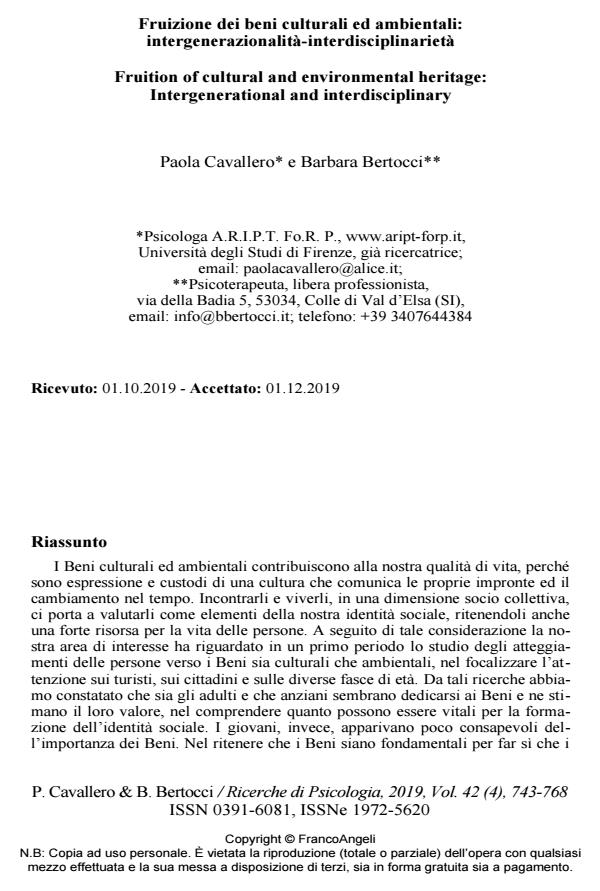Fruition of cultural and environmental heritage: Intergenerational and interdisciplinary
Journal title RICERCHE DI PSICOLOGIA
Author/s Paola Cavallero, Barbara Bertocci
Publishing Year 2020 Issue 2019/4
Language Italian Pages 26 P. 743-768 File size 230 KB
DOI 10.3280/RIP2019-004010
DOI is like a bar code for intellectual property: to have more infomation
click here
Below, you can see the article first page
If you want to buy this article in PDF format, you can do it, following the instructions to buy download credits

FrancoAngeli is member of Publishers International Linking Association, Inc (PILA), a not-for-profit association which run the CrossRef service enabling links to and from online scholarly content.
Abstract Cultural and environmental heritage makes a considerable contribution to the quality of our life because it is the expression and custodian of a culture that leaves its mark and conveys the changes that take place over the years. Finding them and living them in a socio-collective dimension leads us to value them as elements of our social identity, also considering them a great resource for people’s lives. As a consequence of this consideration, our area of interest has focused in a first period of study on people’s attitudes towards goods, whether cultural or environmental, focusing on tourists, citizens and the different age groups. From these investigations, we have found that both adults and the elderly seem to devote themselves to Heritages and appreciate their value, by understanding how much they can be vital for the formation of social identity. The youth, on the other hand, seemed unaware of the importance of the Heritages. Considering, however, that Assets are fundamental to ensure that young people develop their personal, cultural and work identity, we have proposed intergenerational laboratories (work groups) on this subject. In these "open laboratories", the young people involved in an action-research task could approach to both the richness of environmental reality and the other generations. The Laboratories focused, for example, on the visualization and active search of photos and people as well as on cultural and environmental heritage.The photographs fulfil two functions: the individuation and the invitation to carry out cross-sectional routes of interest in time and space. The photographs acquire value over time because they become memories in relation to the emotions felt in a past time, attributing the memories a value. Another task for the youngs has been to visit the Parish Archives (of the church) and the Municipal Archives. Historical archives of the Community were visited with the elderly, to find out biographical data about their own ancestors and to be able to arrive at a more precise narration of their history. Each young man "available to experience" had promised to also collect in their family environment, data, information, photographs, everything that illustrated their ancestors. Experts from other disciplines also participated in the laboratories to show, for example, to young people the different vision of the same problem regarding a Good. These experiences have allowed in an empathic sharing between the different generations and the young people have had the opportunity to live and talk with each other about the social life of their ancestors in a new modality, in the reappropriation of a part of their history. Facing one’s own life, opening a new communication between them has also meant having a new communication with the elders, traveling the path of the common heritage of the community itself. The experience of these "Open Laboratories" has allowed us to advance our action-training research, carrying out "School-work alternation" experiences with observation, study and communication, in an intergenerational and interdisciplinary perspective. Therefore, it can be considered that the enjoyment of Goods (cultural and environmental) can contribute to the development of the person not only from the economic point of view, but also professional and social. In this perspective, historical knowledge and revaluation can be the factors used to reinforce the cultural identity, place and future professional identity of young people in an intergenerational and interdisciplinary exchange.
Keywords: Heritage, cultural, environmental, intergenerational, interdisciplinary, school alternated with work.
Paola Cavallero, Barbara Bertocci, Fruizione dei beni culturali ed ambientali: intergenerazionalità-interdisciplinarietà in "RICERCHE DI PSICOLOGIA " 4/2019, pp 743-768, DOI: 10.3280/RIP2019-004010